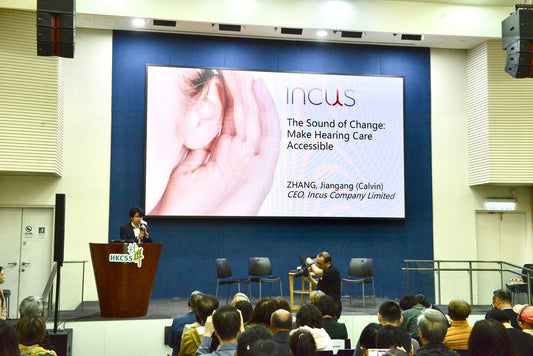
Sudden ringing in the ears can be a worrying experience. Also known as tinnitus, this phenomenon can make us concerned that we are losing our hearing. However, can tinnitus actually cause hearing loss? This article explains how tinnitus is related to hearing loss.
What Is Tinnitus?
Tinnitus refers to ringing or buzzing in the ears without an external sound source. Usually, it is perceived as a high-pitch ringing sound, but patients have also used other words to describe their experience, for example:
- Buzzing
- Roaring
- Clicking
- Hissing
- Humming
When someone is experiencing tinnitus, other people cannot hear the sounds. So it is no wonder that severe cases can get people to question their sanity. Strong and persistent phantom sounds can cause anxiety, sleep deprivation, inability to focus or frustration.
Tinnitus Statistics: Linking Tinnitus with Hearing Loss
Firstly, mild cases of tinnitus are common:
- One out of five adults asked reported they have experienced tinnitus at some point
- Around 10% of the adult population in the United Kingdom experiences tinnitus frequently
- Every year, roughly 10% of the United States population experiences tinnitus lasting five minutes or longer
- Around 5% feel that tinnitus affects their quality of life
The mild cases of sudden, temporary ringing in the ears typically come after listening to music loudly or staying stressed or awake for a long time. One study of amateur rock musicians found temporary hearing loss and tinnitus in both ears immediately after band practice. These cases are not necessarily related to hearing loss or other underlying health issues.
More severe, frequent or persistent cases, however, do have a relationship with hearing loss:
- 90% of patients with tinnitus also suffer from hearing loss
- 30% of people with hearing loss experience tinnitus
In other words, if you have tinnitus, then you most likely also have a hearing loss. However, less than a third of those with a hearing loss experience tinnitus.
So why is it that the statistics show such a strong link between tinnitus and hearing loss?
The Relationship Between Tinnitus and Hearing Loss Explained
To understand why there is a link between tinnitus and hearing loss, we need to go back to the basics of why some people experience a ringing sensation in their ears.
Disease, injury, noise or ageing can damage the sensitivity of the hair cells. The damage leads to hearing loss, and the damaged neurons in the ear end up understimulated. In some people, the neurons will trigger in the absence of external sound, which the brain interprets as sound.
This phenomenon is comparable to when some people experience phantom pains after losing a limb.
Tinnitus is still not fully understood by researchers, but this is the most widely accepted explanation of how you can get tinnitus from hearing loss.
Can Tinnitus Cause Hearing Loss?
Liu Dianzhen, Director of the Department of Otolaryngology in National Taiwan University Hospital, emphasised tinnitus and hearing loss are often symptoms of ear disease. Tinnitus would not directly lead to hearing loss.
Consider the common cold, which causes cough, nasal congestion, and sore throat. However, coughing is not caused by nasal congestion or a sore throat. It is just a symptom of a respiratory tract infection.
Similarly, when the auditory pathway (outer ear, middle ear, inner ear, and brain) is abnormal, tinnitus is one of the common symptoms of the following diseases:
- Diabetes
- Kidney disease
- Menopause
- Sleep disorders
- Stress-related problems
- Ear diseases
Conclusion
In the majority of cases, tinnitus does not directly cause hearing loss.
However, the two conditions often co-exist, with 90% of people experiencing ringing in the ears also having hearing loss.
Tinnitus can be a sign of an undetected hearing loss or be a common symptom of diseases like diabetes, kidney disease, menopause, sleep disorders, stress-related problems or ear diseases.



